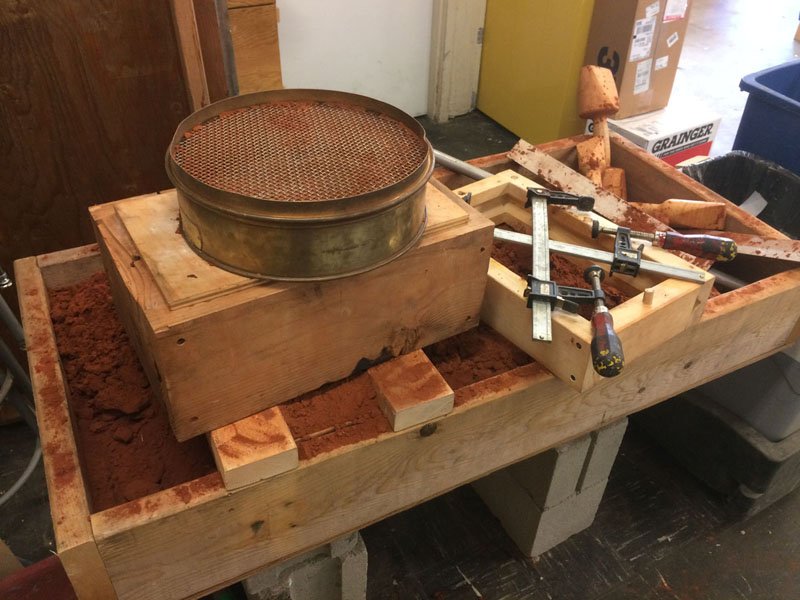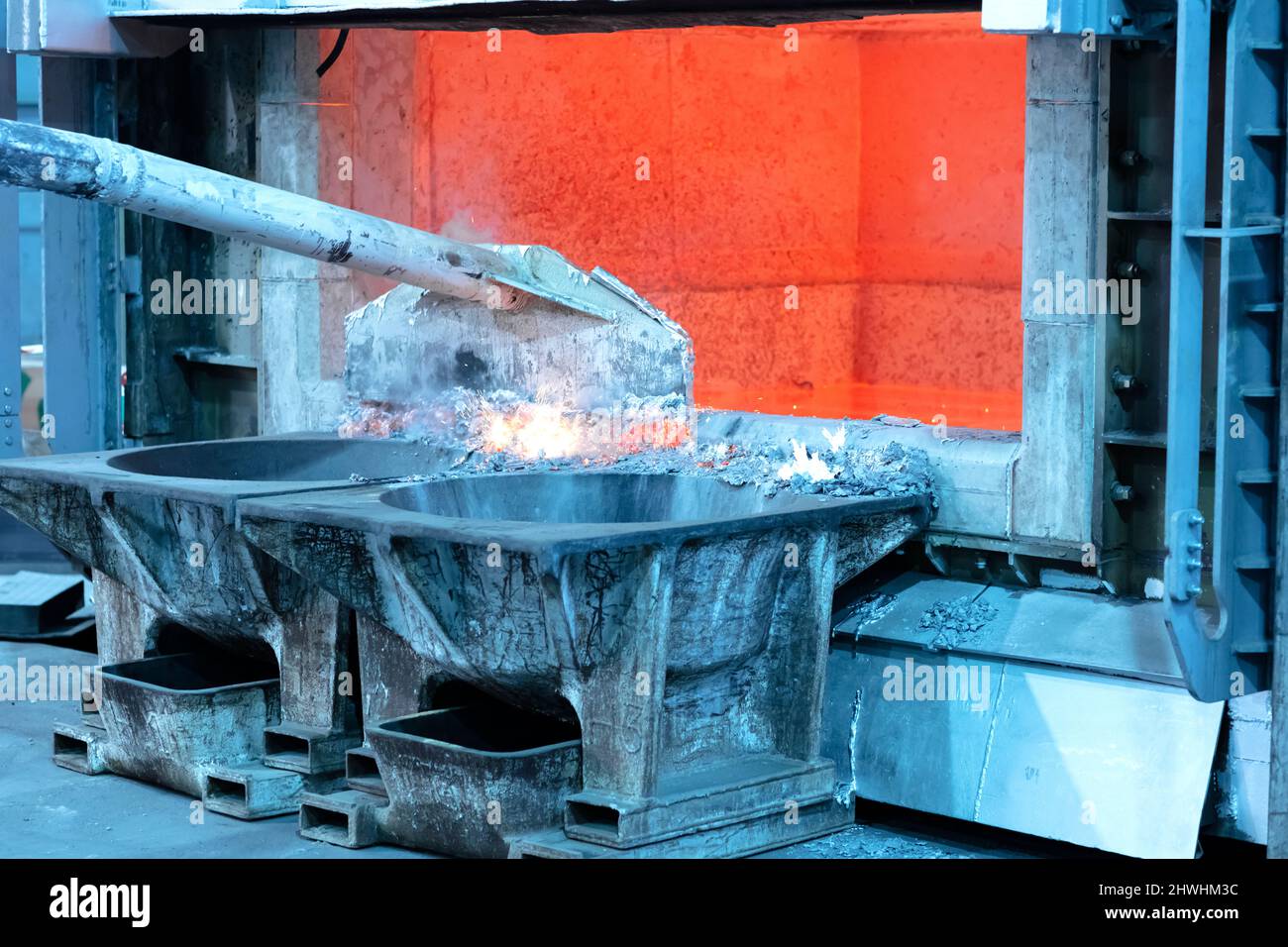Comprehending the Benefits and Innovations in the Aluminum Foundry Sector
The Aluminum Foundry market plays a necessary role in modern production. Its light-weight residential properties significantly boost gas efficiency, especially in auto and aerospace markets. In enhancement, Aluminum's resistance to corrosion assurances durability in different applications. As the sector advances, innovations such as sophisticated recycling and additive manufacturing are reshaping production methods. Exploring these advancements reveals not just the advantages yet additionally the difficulties in advance for Aluminum factories in a rapidly changing market.
The Lightweight Benefit of Aluminum
Aluminum's light-weight nature uses significant benefits throughout different industries, particularly in manufacturing and transport. Its reduced thickness enables the manufacturing of parts that are easier to handle and mount, resulting in reduced labor prices and boosted effectiveness. In the automobile sector, lighter vehicles add to improved gas economic situation and reduced discharges, aligning with international sustainability objectives. Likewise, in aerospace, making use of Aluminum reduces the total weight of aircraft, which is crucial for enhancing efficiency and lowering operational costs.
Additionally, Aluminum's light-weight properties promote innovative styles that were formerly impractical with larger materials. This versatility enables makers to create complicated forms and structures while keeping structural stability. On the whole, the lightweight benefit of Aluminum not just enhances item efficiency but likewise drives developments in modern technology and design, making it a favored product in various applications.
Deterioration Resistance and Toughness
The Aluminum Foundry industry is renowned for creating products with superior deterioration resistance, making them optimal for various applications. This residential or commercial property, incorporated with boosted structural honesty, adds to the lasting efficiency benefits that Aluminum elements supply. As a result, markets significantly count on Aluminum to satisfy requiring ecological conditions without compromising high quality.
Superior Rust Resistance
While different steels encounter significant difficulties from ecological variables, Aluminum stands out for its remarkable corrosion resistance, making it a favored option in lots of applications. This home is largely due to a natural oxide layer that bases on the Aluminum surface, offering a barrier against wetness and destructive representatives. Unlike various other metals that might rust or deteriorate over time, Aluminum maintains its integrity also in extreme settings, such as seaside areas or commercial setups. Furthermore, its lightweight nature combined with corrosion resistance makes it optimal for applications in aerospace, automobile, and marine markets. Generally, Aluminum's extraordinary durability not only enhances product durability however additionally lowers upkeep costs, offering a compelling advantage for customers and makers alike.
Improved Architectural Stability
Engineers and developers significantly recognize the relevance of improved structural stability in modern applications, where both rust resistance and resilience are crucial. Aluminum alloys, recognized for their lightweight homes, additionally display exceptional resistance to deterioration, making them appropriate for harsh atmospheres. The innovative methods used in the Aluminum Foundry industry add considerably to creating parts with enhanced durability. Advanced casting procedures and alloy compositions are customized to meet details performance needs, making certain that structures can stand up to extreme problems without compromising stability. In addition, surface treatments and finishes boost the lifespan of Aluminum products, additionally minimizing deterioration over time. This concentrate on improved architectural honesty not just expands the use of materials but also decreases upkeep prices, solidifying Aluminum's setting as a material of selection in different industries.
Durable Performance Advantages
Resilient efficiency in Aluminum parts is largely credited to their superior rust resistance and toughness. Unlike many steels, Aluminum normally develops a safety oxide layer, which protects against corrosion and deterioration in various settings, consisting of industrial and aquatic settings. This fundamental residential or commercial property considerably expands the life-span of Aluminum products, minimizing upkeep and substitute costs. In enhancement, the light-weight nature of Aluminum enhances its applicability throughout sectors without jeopardizing strength. The product's resistance to deterioration likewise contributes to its integrity popular applications, making it an ideal selection for automobile, aerospace, and building sectors. As sectors progressively focus on sustainability and durability, Aluminum's efficiency benefits align with contemporary engineering needs, solidifying its duty in ingenious manufacturing procedures.
Ecological Effect and Sustainability
 As the Aluminum Foundry industry develops, it increasingly prioritizes environmental influence and sustainability, acknowledging the need for liable practices in the face of environment change. Efforts to decrease waste and power intake are at the leading edge, with lots of shops adopting recycling campaigns to reclaim Aluminum scrap. This not only reduces resources use but also significantly lowers power expense, as recycled Aluminum requires only a fraction of the energy contrasted to main manufacturing.
As the Aluminum Foundry industry develops, it increasingly prioritizes environmental influence and sustainability, acknowledging the need for liable practices in the face of environment change. Efforts to decrease waste and power intake are at the leading edge, with lots of shops adopting recycling campaigns to reclaim Aluminum scrap. This not only reduces resources use but also significantly lowers power expense, as recycled Aluminum requires only a fraction of the energy contrasted to main manufacturing.Furthermore, innovations in emissions manage modern technologies are being executed to lower air pollutants, lining up operations with more stringent ecological laws. Shops are also discovering different power resources, such as solar and wind, to power their facilities sustainably. By fostering partnership with stakeholders, the market intends to develop ingenious options that boost environmental stewardship. Collectively, these initiatives highlight a dedication to reducing the Aluminum Foundry's carbon impact while advertising a circular economic situation within the manufacturing sector.
Advanced Production Techniques
 Reinventing production procedures, the Aluminum Foundry market is increasingly incorporating sophisticated production techniques to improve effectiveness go now and accuracy. Methods such as computer mathematical control (CNC) machining and additive production have arised as vital components in enhancing production process. CNC machining enables high-precision component manufacture, considerably reducing product waste and manufacturing time. Additive manufacturing opens up brand-new avenues for intricate geometries and lightweight designs that were previously difficult to attain.
Reinventing production procedures, the Aluminum Foundry market is increasingly incorporating sophisticated production techniques to improve effectiveness go now and accuracy. Methods such as computer mathematical control (CNC) machining and additive production have arised as vital components in enhancing production process. CNC machining enables high-precision component manufacture, considerably reducing product waste and manufacturing time. Additive manufacturing opens up brand-new avenues for intricate geometries and lightweight designs that were previously difficult to attain.Furthermore, the deployment of automation and robotics in Aluminum shops improves procedures, reduces human mistake, and enhances employee security. These innovations help with an even more receptive production environment, allowing manufacturers to adapt promptly to market demands. The assimilation of sophisticated simulation software application additionally improves the layout and testing phases, leading to premium product top quality. Jointly, these techniques not only boost operational effectiveness but also foster technology, placing the Aluminum Foundry market at the forefront of modern-day manufacturing.
Innovations in Recycling Procedures
The Aluminum Foundry sector is not just progressing in making methods however is likewise making significant strides in reusing procedures. Innovations are arising to boost the effectiveness of recycling methods, lowering power consumption and improving sustainability. Advanced arranging modern technologies, such as automatic optical sorting, allow the identification and splitting up of Aluminum from various other products with high precision. This leads to a better of recycled Aluminum, which is essential for keeping the stability of the end products.
In addition, closed-loop recycling systems are being implemented, allowing manufacturers to recycle Aluminum scrap within their own production procedures. This lessens waste and promotes a circular economy. Furthermore, research into new recycling methods, such as hydrometallurgical processes, provides the capacity for recovering Aluminum from important source intricate waste streams. These innovations not just add to minimizing the carbon footprint of the Aluminum Foundry sector but likewise strengthen its economic feasibility in an increasingly environmentally conscious market.
Applications Throughout Various Industries
Various sectors are significantly identifying the versatility and advantages of Aluminum Foundry products, causing extensive applications across fields such as vehicle, aerospace, consumer, and building goods. In the vehicle industry, Aluminum castings add to lightweight car layouts, boosting fuel performance and efficiency. Aerospace suppliers make use of Aluminum elements for their strength-to-weight proportion, important for airplane frameworks and components.
In building and construction, Aluminum is preferred for its longevity and resistance to rust, making it suitable for home window structures, roof covering, and architectural assistances. Customer items additionally gain from Aluminum Foundry items, as seen in cookware, electronic devices, and product packaging, where light-weight and recyclable products are vital.
The adaptability of Aluminum Foundry methods enables detailed designs and precise requirements, dealing with the diverse needs of these industries. As an outcome, Aluminum Foundry products are becoming integral to contemporary manufacturing processes across numerous markets.
Future Fads in Aluminum Foundries
As sectors remain to evolve, Aluminum factories are poised to embrace numerous essential trends that assure to boost performance and sustainability. One popular trend is the raising fostering of digital innovations, consisting of automation and fabricated knowledge, which improve procedures and boost quality assurance. In addition, the push towards sustainable techniques is leading shops to purchase recycling modern technologies, substantially reducing waste and energy consumption.
 An additional emerging fad is making use of advanced alloys and products, dealing with the growing need for resilient and lightweight components throughout different markets (Aluminum Foundry). The integration of additive manufacturing strategies is anticipated to change part style, supplying personalization and lowering lead times.
An additional emerging fad is making use of advanced alloys and products, dealing with the growing need for resilient and lightweight components throughout different markets (Aluminum Foundry). The integration of additive manufacturing strategies is anticipated to change part style, supplying personalization and lowering lead times.Collaboration with research study organizations is also anticipated to drive technology, as foundries seek to establish new procedures and products. Aluminum Foundry. Collectively, these patterns suggest a transformative future for the Aluminum Foundry market, lining up with wider objectives of sustainability and effectiveness
Regularly Asked Inquiries
What Are the Typical Expenses Linked With Aluminum Foundry Manufacturing?
The common expenses linked with Aluminum Foundry production include basic materials, labor, power, devices upkeep, and overhead expenditures. These aspects collectively influence the overall monetary investment needed for reliable Aluminum spreading procedures.
Just How Does Aluminum Contrast to Various Other Steels in Toughness?
Aluminum, while lighter than lots of steels, displays impressive strength-to-weight proportions. Contrasted to steel, Aluminum is much less strong however uses exceptional rust resistance, making it a favorable choice in applications where weight and toughness are crucial.
What Precaution Are in Place in Aluminum Foundries?
Precaution in Aluminum factories commonly include compulsory individual safety tools, ventilation systems to control fumes, routine equipment maintenance, training programs for staff members, and adherence to rigorous safety guidelines to decrease dangers related to liquified metal handling.
Exactly How Is Quality Control Managed in Aluminum Casting Processes?
Quality control in Aluminum spreading processes entails extensive inspections at different stages, including basic material examination, process tracking, and end product screening. Techniques such as analytical procedure control and non-destructive screening warranty adherence Click Here to market standards.
What Qualifications Are Crucial for Aluminum Foundry Suppliers?
The importance of accreditations for Aluminum Foundry suppliers consists of ISO 9001 for top quality administration, ISO 14001 for ecological monitoring, and industry-specific criteria like ASTM and SAE, ensuring conformity, security, and integrity in producing procedures.
The Aluminum Foundry market plays an essential duty in contemporary manufacturing. The Aluminum Foundry industry is renowned for creating products with superior deterioration resistance, making them optimal for various applications. Revolutionizing manufacturing procedures, the Aluminum Foundry market is significantly integrating advanced production techniques to improve effectiveness and accuracy. The Aluminum Foundry sector is not only advancing in making techniques however is additionally making significant strides in recycling procedures. As sectors proceed to advance, Aluminum foundries are poised to accept a number of crucial fads that guarantee to boost performance and sustainability.